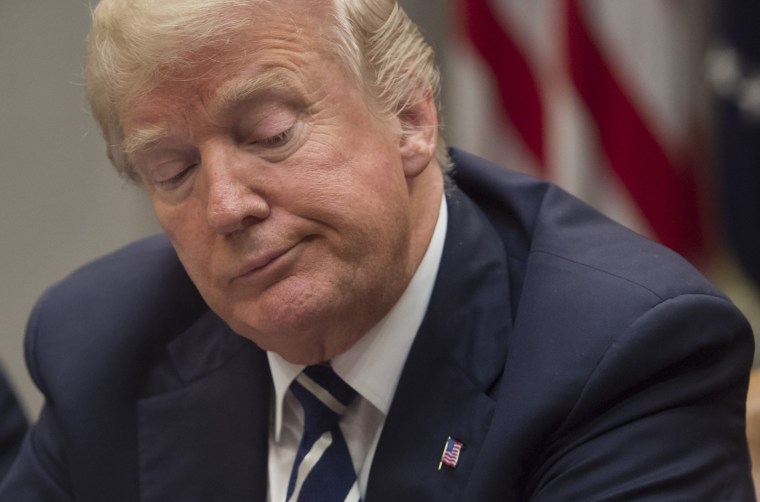In the fall, after Donald Trump and White House Chief of Staff John Kelly clashed publicly with Rep. Frederica Wilson (D-Fla.), Trump World faced repeated questions about the president and his provocative views on race. Press Secretary Sarah Huckabee Sanders grew exasperated by the entire discussion.
"The media continues to want to make this and push that this is some sort of a racially charged ... White House," the president's chief spokesperson told reporters.
Of course, if Sanders doesn't want Americans to see Trump's presidency as racist, she should probably focus her concerns less on the media and more on her boss.
President Donald Trump referred to Haiti and African nations as "shithole countries" during a meeting with a bipartisan group of senators at the White House, a Democratic aide briefed on Thursday's meeting told NBC News.Trump's comments were first reported by The Washington Post, which said the nations referred to by Trump also included El Salvador.Two sources briefed on the conversation say that during the portion of the conversation about Haiti — which came at the top of the exchange that led to the "shithole" comment — the president questioned why Haitians should be given specific consideration.
According to the Washington Post, Trump added that he'd prefer to see immigrants from countries such as Norway -- which is an overwhelmingly white country.
In late December, the New York Times had a related report about the president making behind-the-scenes comments about Haitians, whom Trump reportedly said "all have AIDS." Referencing immigrants from Nigeria, he reportedly added that they'd never "go back to their huts" in Africa after having seen life in the United States.
At the time, the White House pushed back aggressively against the article, insisting that the quotes were inaccurate. Yesterday, however, Trump World made no real effort to deny the president's "shithole countries" comments, which had been heard by a bipartisan group of lawmakers.
Toward the end of the 2016 campaign, Trump, desperate to win Florida, traveled to Miami and spent some time at the Little Haiti Cultural Center, stressing the "common values" he shared with Haitian Americans. "Whether you vote for me or not," Trump said at the time, "I really want to be your biggest champion."
I'm starting to think the sentiment wasn't entirely sincere.
Jeff Greenfield, a longtime political observer, raised a point that got me thinking last night. He noted that when then-Senate Majority Leader Trent Lott made racist comments, Republican leaders forced him from his post, and when GOP voters in Louisiana chose David Duke as their gubernatorial nominee, Republicans en masse disavowed him. What, Greenfield pondered, will the party do with Trump?
The answer, I suspect, is literally nothing. Some will issue mild rebukes in press releases, and I'm sure we'll see some furrowed brows for a day or two, but Donald J. Trump's political life has long been defined by racism, and in contemporary Republican politics, that hasn't been a disqualifier.
As disgusting as the president's comments were yesterday, they weren't surprising in the least. This is the man we recognize all too well. After all, Trump's rise to political prominence was fueled in large part by his role championing a racist conspiracy theory about the nation's first black president. As a candidate for the nation's highest office, Trump went after a federal judge because of his ethnicity, hesitated when asked to denounce David Duke, and equated Mexican immigrants with rapists.
Once in office, Trump pushed several versions of a bigoted Muslim ban, defended racist activists as "very fine people," promoted racist videos from a British fringe group, launched a prolonged feud with athletes of color engaged in a silent civil-rights protest, and couldn't even get through an event honoring Navajo Code Talkers without mocking "Pocahontas." (These are not the only recent examples.)
It's against this backdrop that GOP officials continue to defend, enable, and support their party's president, showing him deference and respect, unmoved by concerns about Trump's lack of respect for those who aren't like him.
In October, House Speaker Paul Ryan (R-Wis.), as is his wont, defended Trump on race, insisting the president's "heart is in the right place." Asked how he knew that, the Wisconsin Republican added, "I've had some candid conversations with him about this. Especially during that time [following the Charlottesville violence]. I've had some very candid conversations. And so I do really believe his heart's in the right place."
Perhaps the House Speaker might be willing to revisit that assessment in light of new evidence?
